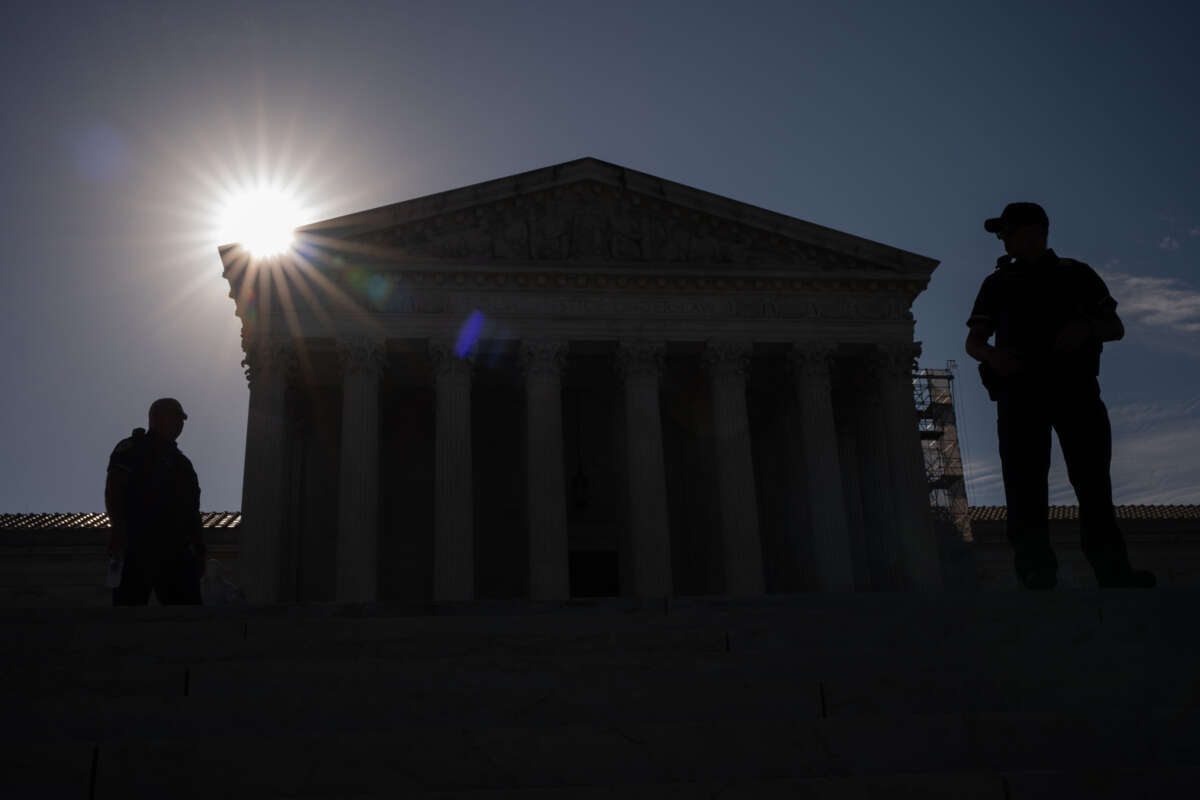Honest, paywall-free news is rare. Please support our boldly independent journalism with a donation of any size.
In the wake of numerous controversies regarding the ethical legitimacy of the U.S. Supreme Court, a new poll demonstrates that the vast majority of Americans, across political lines, want a stronger enforcement mechanism to hold justices of the Court accountable.
An Economist/YouGov poll conducted from June 16-18 found that the Supreme Court currently has a very low approval rating, with only 35 percent giving the institution positive marks and 50 percent saying they disapprove.
Other results from the poll imply that one of the main reasons for the low approval rating is that justices are abusing the Court’s ethics rules, which allow them to decide for themselves whether or not they should recuse themselves from a case.
When asked how they would feel about a new formal ethics code being implemented — one that would allow for justices to be investigated if they are accused of a highly unethical action — nearly 7 in 10 Americans (69 percent) said that they would back such a standard. Only 14 percent were opposed to the idea.
The proposal transcends political ideology — although it is more supported by Democratic-leaning voters (84 percent approval), it is also backed by a majority of independents (64 percent) and even most Republican voters (58 percent).
While the idea of stricter ethics rules is vaguely outlined within the polling question, the numbers show strong backing for a change from the current standard of allowing justices to decide for themselves if they should recuse on key issues.
The poll was conducted weeks after Justice Alito’s flag controversy made headlines along with his refusal to step away from a case regarding the January 6, 2021, attack on the U.S. Capitol and other litigation involving former President Donald Trump.
Just days after the January 6 attack, an upside-down U.S. flag was placed outside the Alito home in Washington D.C.; such flags were then being used as symbols of support for Trump and his efforts to overturn the 2020 election. In the summer of 2023, the Alito vacation home in New Jersey sported an “Appeal to Heaven” flag for several days, which has been used by far right Christian nationalist groups and was prevalent at the Capitol attack.
Alito has blamed his wife for flying the flags, an explanation that legal experts find questionable and irrelevant to the matter of Alito’s biases potentially affecting future rulings.
Other ethics issues abound within the Supreme Court, including Justice Clarence Thomas receiving millions of dollars in extravagant gifts from right-wing billionaire benefactors who have political agendas before the Court.
Ethics rules established by the High Court last fall require justices to step aside from cases when their “impartiality might reasonably be questioned” or if there was “doubt that the Justice could fairly discharge his or her duties.” But the rules are self-enforcing — the justices themselves decide whether they should recuse, an incredibly lenient standard for the sole political branch of government that is not directly beholden to the people.
Democrats on the House Oversight Committee sent a letter to Chief Justice John Roberts last week, questioning the rules’ efficacy in maintaining respect and trust in the Supreme Court.
“You have repeatedly asked Congress and the American people to trust Justices of the Supreme Court to police their own conduct…Yet, over the past year, revelations by investigative reporters and Senate investigators have established that certain Justices have abused that trust,” said the letter, written by Reps. Jamie Raskin (D-Maryland) and Alexandria Ocasio-Cortez (D-New York).
Citing the Alito and Thomas controversies specifically, the letter also noted that the Court “appears unwilling to take any steps to ensure Justices abide by the Court’s Code of Conduct or constitutional and statutory authorities guaranteeing that cases be heard by impartial judges.”
“Since you have refused to meet with Congress, we question what steps you are actually taking as either the Chief Justice or the presiding officer of the Judicial Conference to investigate these glaring episodes of political bias and lack of disclosure,” the letter added.
Thank you for reading Truthout. Before you go…
…We ask that you take just a second to read this message.
We are up against a far-reaching, wide-scale attack on press freedom coming from the Trump administration. Since his inauguration last year, we’ve seen frightening censorship, a right-wing takeover of the news industry, and worsening financial conditions for progressive nonprofits across the board.
We can only resist Trump’s agenda by cultivating a strong base of support. The right-wing mediasphere is funded comfortably by billionaire owners and venture capitalist philanthropists. At Truthout, we have you.
We need your help to sustain the fight against authoritarianism in 2026. Please take a meaningful action in this fight: make a one-time or monthly donation to Truthout. If you have the means, please dig deep.
